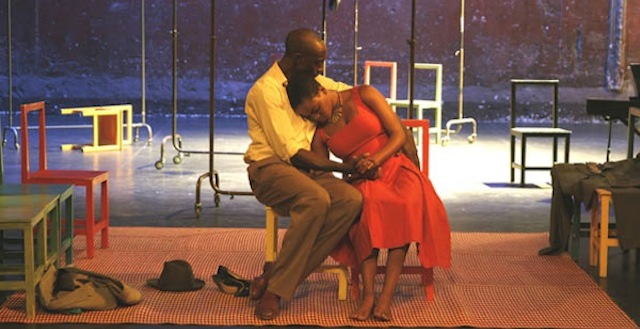Stage Review: ‘The Suit’ Tells a Tragic Tale of South Africa

Ethereal, melancholic, and beautiful, The Suit, playing now at American Conservatory Theater through May 18th, shows us the humanity and pain of relationships.
Adapted from a short story by Can Themba, the play tells the story of a young couple, Mathilda and her doting husband Philomen, living in a slum in Apartheid-era South Africa. One day, Philomen comes home from work early to find Mathilda with another man. In his haste to escape, the man leaves behind his suit. To punish his cheating wife, Philomen forces her to keep the suit visible in the house and to treat it like an honored guest.
An interesting element of the show was the almost fable-like way in which the story was told. There is a narrator who provides the framing of events, but also participates in the action as a variety of different characters. Philomen and Mathilde also speak often in soliloquy, not such that they speak directly to the audience, but by talking about the characters emotions and reactions.
Philomen often refers to himself in the third person as he goes about his work. This creates the effect of the story being told like a folk tale out of a book, but it also helps us to understand the inner lives of the characters.
The colorful, bright staging also worked to create this unreal atmosphere of fable. There was never more on stage than some costume racks and colorful chairs, but the characters rearranged these as was needed to create different spaces for action. Add to this the fact that all props (besides the suit) are pantomimed by the actors, and the imaginative aspect of a play as storytelling is brought to the forefront.
The music of the play must also be noted. From the very beginning, when we are ushered into the show by three musicians, the music played by these musicians is central to telling the story. Using only an accordion, piano, guitar and trumpet, these three score much of the action with a mixture of jazz and South African music.
Beyond this, they use their instruments to create sound effects for the pantomimed and the unseen. And this is to say nothing of the glorious singing of Nonhlanhla Kheswa (Mathilda), who delivers a few absolutely gorgeous numbers.
If there is one criticism I have for this show it is that the pacing had a tendency to be jarring and irregular. The show is filled with moments where we see the horrors of Apartheid through stories of mistreatment and murder by the white over-class. However, while each of these vignettes is powerful and poignant on its own, they are integrated into the play poorly. The effect is that at times the mood will change so suddenly that you are pulled out of the action.
This being said, the central narrative developed effectively, as Mathilda’s shame and humiliation lead to tragic conclusions. The curtain closed on a strong finish, which pulled the heartstrings and left the audience in deep reverie.




